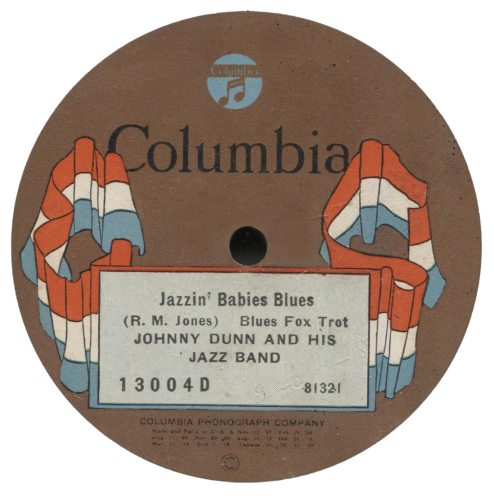
“I Promised Not To Holler But Hey! Hey!”
Johnny Dunn And His Jazz Band
(Columbia 13004 D mx 81322 ) October 30, 1923
“Jazzin’ Baby Blues”
Johnny Dunn And His Jazz Band
(Columbia 13004 D mx 81321) October 30, 1923
Here are two pre-microphone era jazz recordings from a hard-to-find record in the Edward Mitchell collection.
This record was one of only eight issued in Columbia’s 13000-D catalog number series of so-called “race records.” In an era when it was common for hotels to skip over the number 13 when designating floor and room numbers, Columbia officials quickly realized that widespread superstition about that number would cut into sales of any catalog number series that started with it. Thus the numbering block used for its “race” series was almost immediately changed to 14000-D.
“Race records” was an industry term used to describe records by black artists performing music that was in high demand by black record buyers. Such records featured a diversity of musical styles including blues, jazz, gospel, “hot” dance band, and sometimes classical and operatic.
The first label to issue “race records” was OKeh when, after the phenomenal success of its 1920 recording of Mamie Smith’s “Crazy Blues,” it became clear that there was a large, lucrative and under-served market for black performers and musical styles that had been almost completely overlooked by the handful of record labels that existed prior to the 1920s. Other labels soon came out with their own line of “race records” and a black-owned independent label also emerged. Over time, increasing numbers of white record buyers became aware of and sought out such records.
Columbia began selling “race records” in 1921 but they were issued under the same catalog numbering scheme as its general interest and popular records. Earlier in the same month that the selections here were recorded, financially troubled Columbia was forced into receivership. During the reorganization period, the company introduced a colorful new “flag label” design and a brand-new catalog numbering system that gave its “race records” their own numbering block.
The industry also had a less-than-flattering term for records that were marketed to rural white audiences, “hillbilly records.” By the early 1950s the terms “race records” and “hillbilly records” had given way to the less derogatory rhythm-and-blues and country-and-western categories. Today, the old “race records” are highly sought after by collectors and tend to fetch premium prices, especially if they are in excellent condition.
Johnny Dunn was regarded as one of the top New York City-based jazz cornet players during the early 1920s, though his fame was eventually eclipsed by other artists such as Louis Armstrong. He made his last recordings in 1928 before permanently moving to Europe where continued to perform but did not make any more records. He died in Paris, France in 1937 from tuberculosis.
This recording “I Promised Not To Holler But Hey! Hey!” was the band’s third try at recording the song. They had previously attempted to record it in sessions held earlier in the year on February 20 and again on March 13, but, for whatever reason, those takes were rejected. My guess is they were very happy to have finally gotten that one knocked off their list.
